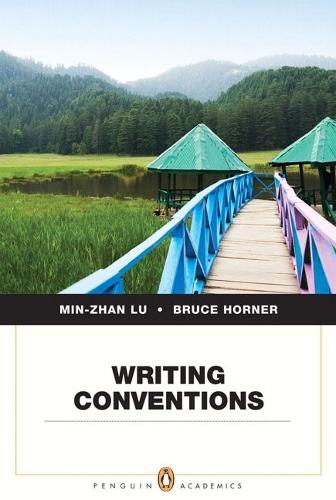Overview
Writing Conventionsteaches the fundamentals of writing by inviting the writer to reflect on their own experiences as writers and to explore new strategies for a variety of academic writing projects.
Full Product Details
Author: Min-Zhan Lu , Bruce Horner
Publisher: Pearson Education (US)
Imprint: Pearson
Dimensions:
Width: 15.20cm
, Height: 1.70cm
, Length: 22.90cm
Weight: 0.630kg
ISBN: 9780321143105
ISBN 10: 0321143108
Pages: 464
Publication Date: 13 February 2008
Audience:
Professional and scholarly
,
Professional & Vocational
Format: Paperback
Publisher's Status: Out of Print
Availability: Awaiting stock 
Table of Contents
Alternate Contents Preface PART ONE: KEY CONCEPTS IN WRITING AND READING Chapter 1 Composing Our Composing Processes Pose Composing Processes of Writing Writing Project Part One Responding to the Writing Situation Using Language in Context Material Resources of Writing Writing Project Part Two Expanding Your Toolkit of Composing Strategies Some cautions about how to talk about composing processes The writing reading thinking talking connection Pre-writing, Drafting, Revision Experimenting with Commonly Recommended Composing Strategies Brainstorming Proofreading Outlining Dictionary Use, Note-taking Scrap Files, Note Taking Re-reading, Satisficing, Questioning Collaborating Writing Project Part Three Conclusion Assignments Chapter 2 Reading and Rereading Writing Project Part One Identifying Habits of Reading Writing Project Part Two Reading in Academic Contexts Writing Project Part Three Reading to Revise and Make New Connections Writing Project Part Four Experimenting with Underlining and Reverse Underlining Conclusion Assignments Chapter 3 Composing Genres Questions for Composing Genres Writing Project Part One (1) Writing Project Part One (2) Strategies for Composing Genres in College Learning an Assigned Genre's Expected Characteristics Writing Project Part Two (1) Learning to Tinker with a Genre's Expected Characteristics Writing Project Part Two (2) Writing Project Part Three Conclusion Assignments Chapter 4 Vocabulary: Composing the Meaning of Words Learning a Specialized Vocabulary The meaning of a word in its environment Writing Project Part One: Word Choice Thinking Living Changes in Possibilities of Word Choice Writing Project Part Two Using Words Critically and Creatively Introducing new neighbors to an established word environment Writing Project Part Three (1) Researching the Historical Shifts in the Meanings of Individual Words Writing Project Part Three (2) Meshing the Specialized Vocabularies of Diverse Groups Writing Project Part Three (3) Writing Project Part Four Conclusion Assignments Chapter 5 Audience: Composing Ways of Reading Anticipating and Proposing an Audience Anticipating and Proposing Ways of Reading Getting Started What type of writing am I expected to produce for this assignment? Where and when is my work going to be evaluated? What has the reaction been to similar types of writing on similar occasions? Posing and Revising Audience when Reading and Writing Proposing Audience in Writing Writing Project Part One Strategies for Composing Audience Looking at the form of assigned readings Writing Project Part Two (1) Imagining an actual reader's response to my writing Writing Project Part Two (2) Reading a text in a different context Writing Project Part Two (3) Conclusion Writing Project Part Three Assignments Chapter 6 Purpose: Composing Goals When Reading and Writing Setting General Purposes When Getting Started Exploring Connections among genre, purpose, and occasion Assessing the relations among Genre, Purpose, and Occasion Writing Project Part One Adding and Revising Purposes When Writing Allow alternative purposes to emerge during writing Writing Project Part Two (1) Creating breaks to explore alternative purposes Writing Project Part Two (2) Writing Project Part Two (3) Writing Project Part Three Conclusion Assignments Chapter 7 Error: Working Rules Common Beliefs about Error Seeing What (May Be) There on the Page Proofreading Techniques Summary of Proofreading Techniques What to Do with What You've Seen: Working Rules Working, Not Just Following, Rules Matters of Agreement and Disagreement Conclusion Assignments PART TWO: SELECTED READINGS Jean Anyon. Social Class and the Hidden Curriculum of Work. Gloria Anzaldua. How to Tame a Wild Tongue. James Baldwin. If Black English Isn't a Language, Then Tell Me, What Is? Sarah Boxer. A New Poland, No Joke. Sandra Cisneros. Little Miracles, Kept Promises. Stephen Jay Gould. A Biological Homage to Mickey Mouse. Langston Hughes. Theme for English B. Eve Fox Keller. Language and Science: Genetics, Embryology, and the Discourse of Gene Action. Thomas Kuhn. The Historical Structure of Scientific Discovery. Royal Philips Corporation. Sense and simplicity. [advertisement] Leslie Marmon Silko. Fences Against Freedom. Karen Springen and Stanford Kay. Green Malls: The Color of Money. Henry David Thoreau. Economy. Henry David Thoreau. The Bean Field. Haunani Trask. From a Native Daughter. Alice Walker. In the Closet of the Soul. PART THREE: ASSIGNMENT SEQUENCES Assignment Sequences Writing History 1. Trask's View of History Writing 2. Trask's Writing of History 3. Testing Trask's Perspective on History Writing with Silko 4. Considering a Different View of History Writing: Thomas Kuhn 5. Kuhn's Writing of History 6. Testing Kuhn's Perspective on History Writing 7. Writing History: Tentative Conclusions 8. The History of What You've Written Writing Science 1. Thomas Kuhn's Critique of Scientific Discovery 2. Applying Kuhn's Critique to Kuhn's Discovery 3. Keller on Science and Writing 4. Gould as a Test Case for Scientific Writing 5. Expanding Research on Science Writing 6. Drawing Conclusions Writing Society 1. Anyon and Your Schooling 2. Applying Anyon's Approach to Anyon's Text 3. Your Writing as Work 4. Alice Walker and the Effects of Writing on Society 5. Anyon's and Walker's Writing as Work on Society 6. Another Voice on Writing and Society: Henry David Thoreau 7. Your Writing as Work on Society Language and the Self 1. James Baldwin on Language and the Self 2. Baldwin's Argument and Little Miracles 3. Trask and Baldwin on Language and the Self 4. Adding Hughes to the Dialogue on Language and the Self 5. Your Language, Your Self Index
Reviews
Author Information
Tab Content 6
Author Website:
Customer Reviews
Recent Reviews
No review item found!
Add your own review!
Countries Available
All regions
|




